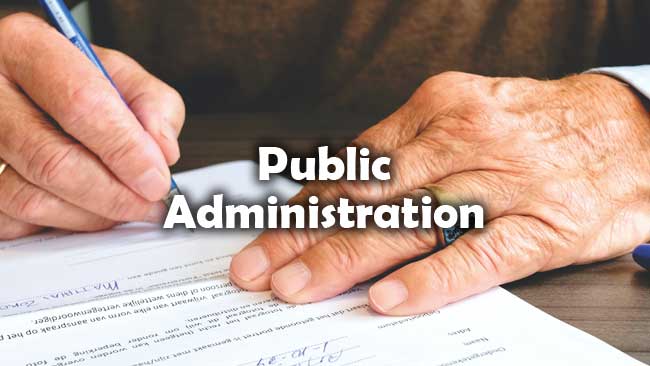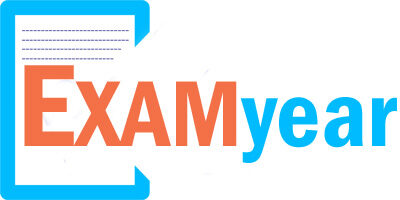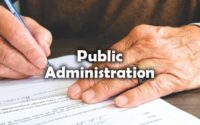Public Administration Previous Year Question Papers
Public Administration previous year question paper pdf for examination is given below. This helps in analyzing Public Administration question and answers. Public Administration exam previous year question papers direct download links are given in this section.

Hence, download the Public Administration Previous Year Paper pdf below. Public Administration Previous year Papers Pdf help the applicants in their preparation.
Previous Year Question Papers on Public Administration
1. The Swadhar scheme was launched in 2000-2001 :
(A) For providing holistic and integrated services to women in difficult circumstances
(B) To meet the credit needs of poor women
(C) For providing temporary shelter to the needy women and girls
(D) For providing financial assistance for the construction of building for working women’s hostels
2. Which of the following characteristics describe the nature of public policy ?
(a) Policy may be narrow or broad.
(b) Policy may be specific or general.
(c) Policy may be positive or negative
Select the correct code :
(A) Only (a) and (b)
(B) Only (b) and (c)
(C) (a), (b) and (c)
(D) Only (c)
3. Which one of the given below is a non-official actor who influences policy making ?
(A) Legislature
(B) Executive
(C) Pressure groups
(D) Bureaucracy
4. Normative Policy Analysis is concerned with :
(A) Description of facts
(B) Value Judgements
(C) Both (A) and (B)
(D) Anecdotes
5. The communication media sets public agenda by :
(a) Amplifying issues
(b) Bringing issues to the public attention
(c) Broadcasting thought provoking documentaries concerning community life/ human life
Select the correct code :
(A) Only (a) and (b)
(B) (a), (b) and (c)
(C) Only (b) and (c)
(D) Only (c)
6. Incremental Model of Policy Making is developed by :
(A) Yehezkel Dror
(B) Charles Lindbloom
(C) Thomas Dye
(D) Herbert Simon
7. Who identified two separate approaches to policy process i.e. emphasizing on knowledge of policy process and knowledge for use in the policy process ?
(A) Pareto
(B) Massey A.
(C) Muller D.
(D) Harold Laswell
8. Command and control regulation is an example of :
(A) Authority based policy instrument
(B) Information based policy instrument
(C) Treasury based policy instrument
(D) Organisation based policy instrument
9. The objective approach to policy evaluation is aimed :
(A) Determining the extent to which laid down objectives are achieved
(B) Understanding objective of policies
(C) Both (A) and (B)
(D) Understanding the efforts of government
10. Assertion (A) : The policy agenda is set by the interplay of public opinion and public power.
Reason (R) : It is possible for policy makers to study the relationship between public opinion and policy agenda.
Answer the question using the codes given below :
(A) Both (A) and (R) are true and (R) is the explanation of (A)
(B) Only (A) is true, (R) is false
(C) Both (A) and (R) are true, but (R) is not the explanation of (A)
(D) Both (A) and (R) are false
11. One of the following is not five elements of administration identified by Kautilya :
(A) The means of starting undertakings
(B) Excellence of men and materials
(C) Provision against failure
(D) Rules about pension to servants
12. Which report is a standard source for making cross-country comparisons of human development ?
(A) Gender Report
(B) World Bank Report
(C) UNDP Report
(D) ILO Report
13. According to World Bank which is not an indicator of good governance ?
(A) Participation
(B) Transparency
(C) Responsiveness
(D) Responsibility
14. Which is the basic assumption of the Public Choice Theory ?
(A) Methodological individualism
(B) Utility maximization
(C) Suboptimization
(D) Integrative communication
15. E-government is :
(A) One-way communication protocol
(B) Two-way communication protocol
(C) Functionality
(D) Diagonal communication
16. Which of the following is not the model of E-democracy ?
(A) Topological model
(B) Electronic Bureaucracy Model
(C) Information Management Model
(D) Civil Society Model
17. According to Second Administrative Commission, public order refers to :
(A) Justice for each …… Peace for all
(B) Friction to fusion
(C) Protecting by Righteousness
(D) Master key to Good Governance
18. Central Administrative Tribunal Act in India has enacted in :
(A) 1948
(B) 1958
(C) 1985
(D) 1988
19. Assertion (A) : The source of all authority under the constitution is the people of India and there is no subordination to any external authority.
Reason (R) : India ceased to be dominion and declared herself republic since making of the constitution in 1949.
Answer the question by using the codes given below :
Codes :
(A) Both (A) and (R) are true and (R) is the correct explanation of (A)
(B) Both (A) and (R) are true and (R) is not the correct explanation of (A)
(C) (A) is true but (R) is false
(D) (A) is false but (R) is true
20. According to whom ‘‘A systematic effort to gain knowledge is ‘Research’ ?
(A) Dr. P.L. Bhandarkar
(B) Rodman and Moore
(C) C.A. Moser
(D) Herring
| GK | Old Question |
| MCQ | Previous Question |
| Quiz | UGC NET |
| Sample Question | IGNOU MPA |
| Model Papers | UPSC |
21. Which of the following is not a data collection method ?
(A) Research problem
(B) Unstructured interviewing
(C) Postal survey questionnaires
(D) Participant observation
22. Mrs. Pauline Young has stated ………. type(s) of facts.
(A) One
(B) Two
(C) Three
(D) four
23. The study of naturally occurring events of a situation is called :
(A) Experimental research
(B) Field research
(C) Survey research
(D) Theoretical research
24. What does ‘Sampling cases’ mean ?
(A) Sampling using sampling frame
(B) Identifying people who are suitable for research
(C) Researcher’s briefcase
(D) Sampling people, newspaper, TV programmes, etc.
25. A research topic is reduced to an acceptable size by :
(A) Working hypothesis
(B) Research hypothesis
(C) Null hypothesis
(D) Alternate hypothesis
26. Formal interviews are :
(A) Uncontrolled
(B) Intensive
(C) Unstructured
(D) Friendly
27. It is a form of non-probability sampling :
(A) Simple random
(B) Stratified random
(C) Systematic
(D) Purposive
28. The prescription-oriented report should not be :
(A) Value Driven
(B) Normative
(C) Casual
(D) Purposive
29. Integral view of Public Administration does not include :
(A) Managerial activities
(B) Technical activities
(C) Clerical activities
(D) Mechanical activities
30. Who is the gospel of neutral principles of administration ?
(A) Gulick
(B) Mayo
(C) Simon
(D) Riggs
31. Which is not the base for selecting an alternative in decision-making process ?
(A) Experience
(B) Experimentation
(C) Research and analysis
(D) Desired opinion
32. Assertion (A) and Reason (R) pattern :
Assertion (A) : Public Administration is more comprehensive than Private Administration.
Reason (R) : Public Administration regulates Private Administration.
Codes :
(A) Both (A) and (R) are true and (R) is the correct explanation of (A)
(B) Both (A) and (R) are true but (R) is not the correct explanation of (A)
(C) (A) is true but (R) is false
(D) (A) is false but (R) is true
33. Decentralisation results from :
(A) Span of control
(B) Delegation
(C) Coordination
(D) Leadership
34. In modern times merit system of recruitment was first introduced in :
(A) Prussia
(B) India
(C) England
(D) USA
35. ‘It does not command; its job is to sell, not tell’, has been said for :
(A) Functional staff
(B) Control staff
(C) Technical staff
(D) Advisory staff
36. Self enforcing discipline is a function of :
(A) Command
(B) Authority
(C) High Morale
(D) Control
37. Which rules govern pension and gratuity to the employees retiring from central civil departments :
(A) Central Civil Services (Pension) Rules, 1972
(B) Central Civil Services (Pension) Rules, 1969
(C) Central Civil Services (Pension) Rules, 1975
(D) Central Civil Services (Pension) Rules, 1962
38. Which of the following principles of management is not propounded by Lyndall Urwick ?
(A) Principle of Investigation
(B) Principle of Control
(C) Principle of Hierarchy
(D) Principle of Experiment
39. McGregor hypothesized that a manager’s assumption about human behavior predetermined :
(A) his administrative style
(B) his decision-making
(C) his interpersonal relations
(D) his line of action
40. Taylor’s scientific managment was first known as :
(A) Scientific Management
(B) Time Study
(C) Rubble Hypothesis
(D) Task and Bonus Management
41. Who was a key figure in the establishment of Administrative staff college at Henley-on-Thames ?
(A) Lyndall Urwick
(B) Luther Gulick
(C) Henri Fayol
(D) Fredrick Taylor
42. Human Relations Theory believed that people are :
(A) Homogenous
(B) Heterogenous
(C) Atomistic
(D) Economic men
43. Assertion (A) and Reason (R) Pattern :
Assertion (A) : Taylor’s primary concern was management at the supervisory level and gave much stress on the efficiency of workers and managers at operational level.
Reason (R) : Scientific management is just a mental revolution for both employer and employees.
Codes :
(A) Both (A) and (R) are true and (R) is the correct explanation of (A)
(B) Both (A) and (R) are true but (R) is not the correct explanation of (A)
(C) (A) is true but (R) is false
(D) (A) is false but (R) is true
44. Who is considered as the pioneer of the New Public Administration ?
(A) Dwight Waldo
(B) Ferrel Heady
(C) Christopher Hood
(D) Both (A) and (C)
45. Who elaborated the term ‘consumerism’ in the context of postmodernism ?
(A) Nietzsche
(B) Derrida
(C) Michel Foucault
(D) Jean Baudrillard
46. The foundation stone of motivation theory is the integrated wholeness of :
(A) The organism
(B) The organization
(C) The society
(D) The nature
47. During the Mahabharata period, the state has been called as :
(A) Rashtra
(B) Saptanghi
(C) Janapada
(D) Vish
48. The civil service system in India during the British times was based essentially on :
(A) European System
(B) Modern System
(C) The Ancient Indian System
(D) The Mughal System
49. Recruitment to the ICS came to be based totally on merit, after :
(A) 1773
(B) 1855
(C) 1892
(D) 1922
50. Which one of the following constitutional powers is not enjoyed by the President of India ?
(A) Appointment of Governors of State
(B) Enjoys discretionary powers
(C) Grants pardons
(D) Promulgates ordinances

